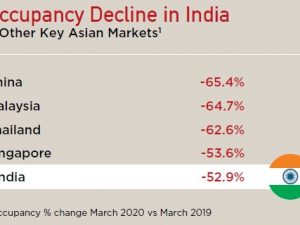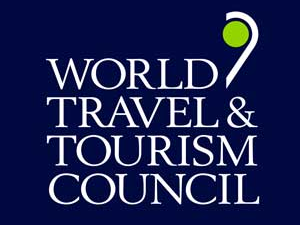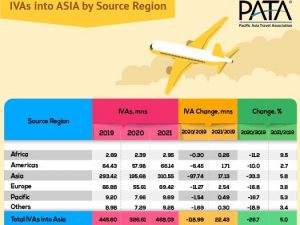The recently-released HVS ANAROCK monthly newsletter titled ‘Hotels & Hospitality Overview’ reveals that among five key Asian markets – India, China, Malaysia, Thailand and Singapore – India had the lowest y-o-y decline in hotel occupancy for March at 52.9 per cent, while China witnessed the highest at 65.4 per cent. Malaysia, Thailand and Singapore witnessed occupancy declines of 64.7 per cent, 62.6 per cent and 53.6 per cent, respectively, for the said period. The report suggests that occupancies across hotels in key Indian cities witnessed a sharp decline, as travel restrictions intensified and India went into lockdown towards the end of March 2020.
Read More »Domestic tourists aged 18-35 will travel first; short-haul countries to pick up next: WTTC
The World Travel & Tourism Council (WTTC) has outlined what the ‘new normal’ will look like as countries begin to end their COVID-19 lockdowns and ease travel restrictions. As travel gradually returns to normal over the coming months, WTTC predicts that the first to return will be domestic markets with staycations, then to a country’s nearest neighbours before expanding across regions, and then finally across continents to welcome the return of journeys to long-haul international destinations. WTTC also believes that younger travellers in the 18-35 age group, who appear to be less vulnerable to COVID-19, may also be among the first to begin travelling once again. The tourism council also informs that new protocols and standards are being defined following feedback and multiple conversations with WTTC members, as well as collaboration from associations who represent the different travel sectors.
Read More »Hotels, travel agents can offer value proposition & unique experiences: Kerrie Hannaford
Kerrie Hannaford, Vice President Commercial, Accor (India & South Asia), says that hotels should work along with travel agents as they are experts in packaging the right products, and together they shall strive towards offering a value proposition and unique experiences to customers. Speaking at the 2nd TravTalk Digital Conclave, she said, “What we need to do collectively, with our consultants, is to become absolute experts in offering something unique and bespoke. There must be those ‘surprise & delight’ moments for our customers. The perception of value for money is going to be crucial. It is also important to know what unique experiences we can give to consumers, whether they are from the same city or have travelled from another end of the country. How the travel agent community helps us to establish that uniqueness is important, so that we can sell something to a consumer. As we step towards that level of recovery, that’s what people are going to want. They want to be able to ‘feel’ the value and it doesn’t matter whether it is a $50 hotel or a $100 hotel. They only want to ensure if they are getting that connectedness, that personalisation and as an industry, we need to come together and build that confidence for consumers.”
Read More »Asia to witness fastest visitor recovery when things resume; intra-region travel to herald growth: PATA
According to a newly updated forecast by Pacific Asia Travel Association (PATA), growth in international arrivals relative to 2019 figures is expected to rebound the fastest in Asia over the years to 2024. The release also suggests that this growth will be driven by intra-regional travel (Asia-to-Asia), with a rebound from a loss of almost 98 million arrivals between 2019 and 2020 to an increase of over 17 million between 2019 and 2021. All the source regions of Asia are projected to show growth between 2019 and 2021, with Europe and the Americas in particular, adding increases in arrivals of 2.5 million and 1.7 million, respectively over that period. By the end of 2021, Asia is predicted to have visitor arrivals numbering five per cent more than in 2019.
Read More »70% expect government bailout, of which 28% hope for monetary relief
A majority of 70% of total respondents are expecting some sort of bailout from the government. Little more than a quarter (27%) of the respondents are expecting a GST and tax holiday from the government and 28% are expecting monetary relief. In terms of inbound agents, 81% are expecting a bailout.
Read More »18% have received enquiries with inbound agents receiving the maximum
Almost 18% of our respondents have started receiving enquires for travel in the future. Of this, 26% were inbound operators and 23% were domestic players. Interestingly, 13% of the participating outbound agents have received regular enquires despite being the worst-hit sector.
Read More »78% expect year-long recovery, but 5% are optimistic to bounce back in 3 months
About 32% respondents feel that the industry will bounce back in six to nine months. But 78% feel that the recovery will take a year. A minuscule 5% are optimistic about a bounce back within the next three months.
Read More »25% staff permanently terminated across industry, with lowest dismissal in airlines
Our findings show that there has been a permanent termination of 25% of staff because of the Covid-19 crises. This includes 40% staff in B2B agencies and DMCs that have been asked to go. GSAs report a 13% redundancy and airlines report a 10% permanent employee termination.
Read More »TravTalk Salary Survey: Tourism industry optimistic as only 41% staff on leave without pay
The result of the ‘TravTalk Salary Survey’ 2020 has revealed that GSAs are working with 80 per cent staff and only 20 percent of them have got salary cuts. Inbound agents have put only 33 percent of their staff on leave without pay. Furthermore, 14 percent of the outbound and domestic agents have reported putting more than 50 percent of their workforce on leave without pay. This survey was conducted anonymously to discuss some of the best employment practices in the industry.
Read More »MoCA should provide win-win solution to both airlines and agents: Jyoti Mayal
Jyoti Mayal, President, Travel Agents Association of India (TAAI), has said that they have had several meetings with the Ministry of Civil Aviation regarding protecting the interest of their members, in the wake of the losses they have suffered because of not getting refunds from airlines amidst the COVID-19 crisis and the eventual shutting down of airline operations. She adds, “Tourism and aviation are inter-dependent. Both airlines and travel agents depend on each other for business and hence we have requested the Ministry of Civil Aviation to look at a solution that is a win-win situation for both. We don’t want airlines to go out of business, but also want to save our businesses. While airlines across the world are seeking monetary support for their survival, they should not be holding back the agents’ or customers’ money, which is lying with them as per advance bookings. They should refund the agents and customers, instead of giving credit shells.”
Read More » Tourism Breaking News
Tourism Breaking News









